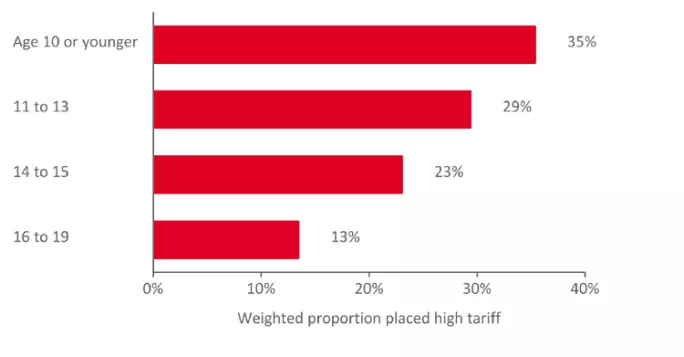The younger pupils are when they decide they want to progress to higher education - the more likely they are to get into an elite university, according to a new report from admissions body Ucas.
Being certain about higher education by age 10 or earlier means a child is 2.6 times as likely to end up at a more competitive university than someone who decided in their late teens, the report Through the lens of students reveals.
Proportion of respondents placed at universities requiring higher grades by the age they felt sure they would apply to university
Ucas asked 18- and 19-year-olds who had applied to go to university in 2015 what motivated them to go to university and what deterred them; 16,600 young people responded to the survey.
The survey reveals that a fifth of applicants had made the decision to apply to university before the age of 10.
And it found the most advantaged young people are more likely to be focused on university at a young age than their more disadvantaged peers.
The survey found that 25 per cent of those in the most advantaged group of children felt sure they would apply to university by age 10 - compared to 18 per cent of those in the least advantaged group.
Mary Curnock Cook, chief executive of Ucas, said: “This report is clear: the earlier children set their sights on university, the more likely they are to go. We need to reset the barometer reading for progression to HE to a much earlier age - ten or younger. Having a focus on university helps provide the rationale for working hard and doing well at GCSEs which is the strongest predictor of success in higher education.”
For those who hadn’t applied to the more competitive universities, the reasons given included a lack of transparency about the entry requirements and a lack of outreach.
- 49 per cent said the entry requirements were too high.
- 41 per cent said none of the universities offered courses they were interested in.
- 20 per cent thought it would be too expensive to live at these universities.
When it came to applying to university at all, 82 per cent of those surveyed said their friends who had not applied to university had wanted to get a job or apprenticeship instead, whereas 58 per cent said they knew people who had not applied because they were not going to get the grades.
There was also widespread concern about the cost of university, debt and finding the right accommodation.
The report recommended that schools and colleges should encourage all learners to think about what they were going to do after 18, at a younger age.





